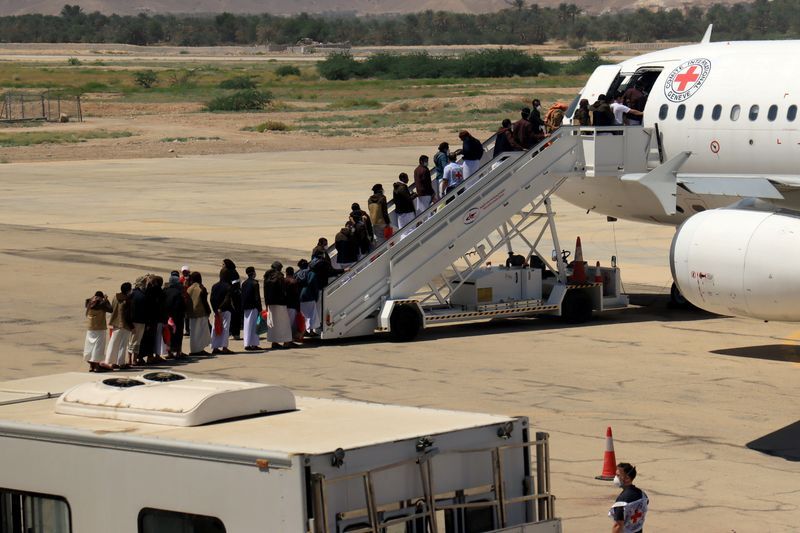Yemen’s warring parties start swap of 1,000 prisoners

By ![]()
Planes carrying prisoners exchanged by the warring parties in Yemen took off from three airports on Thursday in an operation to return about 1,000 men home across the front lines, the International Committee of the Red Cross said.
The Saudi-led military coalition and Yemen’s Houthi movement agreed last month in Switzerland to exchange 1,081 prisoners, including 15 Saudis, in the largest swap since peace talks in December 2018 that have since stalled.
Two airplanes carrying members of the Saudi-led coalition freed from detention took off from the airport in the Houthi-held capital, Sanaa, a Reuters witness said.
One of the airplanes was carrying Saudi and Sudanese detainees and flew to Saudi Arabia. The other plane flew to Sayoun airport in the government-held Hadramout region.
An airplane carrying Houthis released from captivity by the coalition departed Sayoun, and a second arrived from Abha airport in Saudi Arabia, another Reuters witness and sources said.
In a message posted on Twitter, the ICRC later said a total of five planes had taken off from Sayoun, Sanaa and Abha.
“This operation that means so much to so many families is under way,” Fabrizio Carboni, ICRC regional director for the Middle East, told Reuters, speaking from Sanaa airport.
“It is quite remarkable because they are doing this while a conflict is still active.”
TRUST-BUILDING
Under the deal, part of trust-building measures aimed at reviving peace talks, the Iran-aligned Houthi group is to release around 400 people, including 15 Saudi soldiers and four Sudanese, while the coalition would free 681 Houthi fighters.
Yemen has been mired in conflict since the Houthis ousted the internationally recognised government from power in the capital, Sanaa, in late 2014, prompting the Western-backed coalition to intervene in March 2015.
The conflict, seen in the region as a proxy war between Saudi Arabia and Iran, has been in military stalemate for years with the Houthis holding Sanaa and most big urban centres.
The war has killed more than 100,000 people and spawned what the United Nations describes as the world’s largest humanitarian crisis.
With the conflict’s effects intensified by deadly outbreaks of cholera and now COVID-19, some 24 million Yemenis, 80% of the population, require aid, while 20 million lack sufficient food supplies and access to clean water, Carboni said.
ICRC, acting as a neutral intermediary, deployed more than 70 staff and volunteers who conducted medical checks – including providing protective equipment and other measures to guard against the risk of corornavirus infection – and held one-on-one interviews to ensure the detainees wanted to be sent home.
In a statement, U.N. Yemen envoy Martin Griffiths said he hoped the parties would soon reconvene under U.N. auspices to discuss the release of all war-related prisoners and detainees.